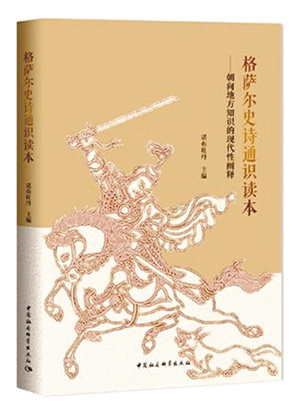
. > WHAT'S NEW > BOOKS
A popular interpretation of Epic of King Gesar
Author : YANG XIA Source : Chinese Social Sciences Today 2021-11-26

A Short Introduction to Epic of King Gesar: A Modern Interpretation Towards Local Knowledge
A Short Introduction to Epic of King Gesar: A Modern Interpretation Towards Local Knowledge is co-authored by scholars engaged in Epic of King Gesar from the Institute of Ethnic Literature at the Chinese Academy of Social Sciences (CASS), Tianjin University, Nankai University, Yunnan University, and other institutions.
The book discusses, in a modern and contemporary context, the inheritance and theoretical achievements of Epic of King Gesar, as well as the diverse epic culture. It comprehensively introduces the cultural traditions, plastic arts, cross-cultural communication, and other knowledge of the epic, serving as a popular reading of refined Chinese traditional culture that features knowledge, scholarship, cutting-edge research, and popularity.
The epic has never been finalized in the long course of history. The accelerated changes in modern life, the literary field, and the disciplinary transformation are redefining, expanding, and enriching the boundaries of epic research. With the epic in a realistic scenario featuring diverse styles, a keen sense of the times, and local cultural marks, the book intends to transcend disciplinary barriers and integrates oral traditions, literary and historical research, philosophy, art, anthropology, and aesthetics, pursuing a holistic vision through interdisciplinary research. Doing so reflects the grand vision that a cultural epic should have.
This book offers a way of thinking for answering the following questions: When orally-passed folk shuochang, a form of traditional Chinese storytelling intermixing speaking and singing, enters into the contemporary cultural context, aesthetic orientation, and emotional structure, what changes will happen to the epic? On the journey of contemporary history, what kinds of inheritance and variations are meeting with the heroic epic, its written texts, and mysterious Gesar artists? What kinds of inheritance and alterations are happening to Epic of King Gesar-themed art forms including the rich and varied music, the Thangka, the cartoon, the Tibetan opera, the stone carvings, the film and television works, and anime? When referring to Epic of King Gesar and oral poetics, the epic and the Homeric epics, its cross-cultural spread, and its going global, how to seek out innovative methods different from traditional ones to gain acceptance for the epic’s historical trajectory, status quo, local knowledge, aesthetic character, inheritance laws, practice methods, social functions, and cultural significance?
The book, from the temporal-spatial and multi-dimensional perspectives, comprehensively demonstrates the evolution of the epic and its basic propositions. In the meantime, it displays the related trend of thought, disciplinary system, and discourse methods under the modern academic concept, that is, sounds, texts, images, hypertext links, cloud technology, etc. Even if they do not replace the existing traditional ways and communication methods of intangible cultural heritage, they have already grown as a new format and a new trend.
Yang Xia is a research fellow from the Institute of Ethnic Literature at CASS.
Ye Shengtao made Chinese fairy tales from a wilderness
Ye Shengtao (1894–1988) created the first collection of fairy tales in the history of Chinese children’s literature...
-
How northern ethnicities integrated into Chinese nation
2023-09-18
-
Mogao caves
2023-09-12
-
Mogao Grottoes as ‘a place of pilgrimage’
2023-09-12
-
Time-honored architectural traditions in China
2023-08-29
-
Disentangling the civilizational evolution of China
2023-08-28
-
AI ethics in science fiction
2023-08-23













 2011-2013 by www.cssn.cn. All Rights Reserved
2011-2013 by www.cssn.cn. All Rights Reserved